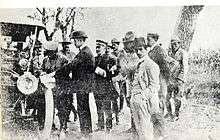Teoloyucan Treaties

The Teoloyucan Treaties[1] were signed on August 13, 1914 at Teoloyucan, State of Mexico, Mexico between the revolutionary army and forces loyal to Victoriano Huerta. The revolutionary army was represented by Álvaro Obregón and Lucio Blanco. The Federal Army was represented by General Gustavo A. Salas and Admiral Othón P. Blanco, while Mexico City was represented by Eduardo Iturbe. The treaties established the surrender of the Federal Army and its dissolution.
Background
In the middle of July 1914, the Huerta government realized that a revolutionary victory was imminent. On July 15 Huerta resigned the presidency and went into exile.
The new government tried to negotiate with the revolutionaries. These negotiations broke down when the revolutionaries demanded the surrender of the capital as well as the dissolution of the federal army.[2]
In August, due to the victories of Venustiano Carranza, interim president Francisco S. Carvajal offered an unconditional surrender. In a meeting with Alfredo Robles Domínguez from the Constitutionalist Army, General José Refugio Velazco, secretary of War and Navy under president Carvajal, said the surrender was caused by the American invasion of Veracruz and Tampico to end the fighting. The entire cabinet went into exile the next day.[3]
Treaty
Accompanied by a Brazilian minister, a French delegate and an American representative, Carvajal went to Teoluyacan and attempted to discuss terms. When this failed, the entire cabinet went into exile. The treaty was signed on August 13. Eduardo Iturbide, governor of Mexico City, and a Huerta sympathizer, signed the surrender of the city. General Gustavo A. Salas and Admiral Othón P. Blanco signed the articles concerning the military. The treaty included the dissolution of the Federal Army, with no provisions for a general amnesty. It also guaranteed protection from looting for the population of Mexico City.[3][4][2] The treaties were signed on a car fender.
After the dissolution of the Federal Army, Carranza issued a decree suppressing the Military School. It did not open its doors until 1920. The Constitutianalist army served as the Mexican army until then.
Centenary
In 2014, in the State of Mexico, all official documents carried the legend "2014. Year of the Teoloyucan Treaties" to mark the centenary.
References
- ↑ Sáenz, Aarón (1964).
- 1 2 Tratados de Teoloyucan
- 1 2 Cumberland, Charles C. (2010-06-28). Mexican Revolution: The Constitutionalist Years. University of Texas Press. ISBN 9780292789630.
- ↑ Mussachio, Humberto (1989).